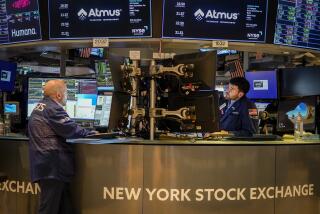Thatcher Fails to Stop Record Drop of Pound
- Share via
LONDON — A sharp government-induced hike in interest rates failed to jolt the British pound out of its record fall today and drew opposition accusations of government “incompetence and vacillation.”
Britain’s Conservative government blamed the crisis on falling oil prices, high U.S. interest rates and lack of confidence brought on by critics demanding heavier expenditure on creating jobs.
With the pound sterling down 15% against the dollar in just four months, Prime Minister Margaret Thatcher’s administration abandoned a key element of its free-market doctrine and allowed the Bank of England today to introduce a minimum lending rate of 12%--up 1.5% from the prevailing rate.
The aim of the central bank’s move was to boost the pound as an attractive investment, and for a few hours it seemed to work. From an opening low of 1.10 to the dollar in Kong Kong, sterling sprang to 1.13 in London. But by the time markets closed, it was down again to 1.1137.
Share prices tumbled on the London Stock Exchange, which was unnerved both by the interest rate rise and its failure to shore up the pound, dealers said.
The Financial Times index of 30 industrial shares plunged by 19 points to 949.3.
Consumers were left with a 12% basic interest rate which will translate into about 13% for preferred customers and 14% or more for other borrowers.
The latest level spelled a probable hike in mortgage rates at a time when the government is encouraging more citizens to own their own homes.
This in turn could raise inflation, which the Conservative government has whipped down from more than 20% four years ago to a current annual rate of 4.9%.
More to Read
Inside the business of entertainment
The Wide Shot brings you news, analysis and insights on everything from streaming wars to production — and what it all means for the future.
You may occasionally receive promotional content from the Los Angeles Times.








